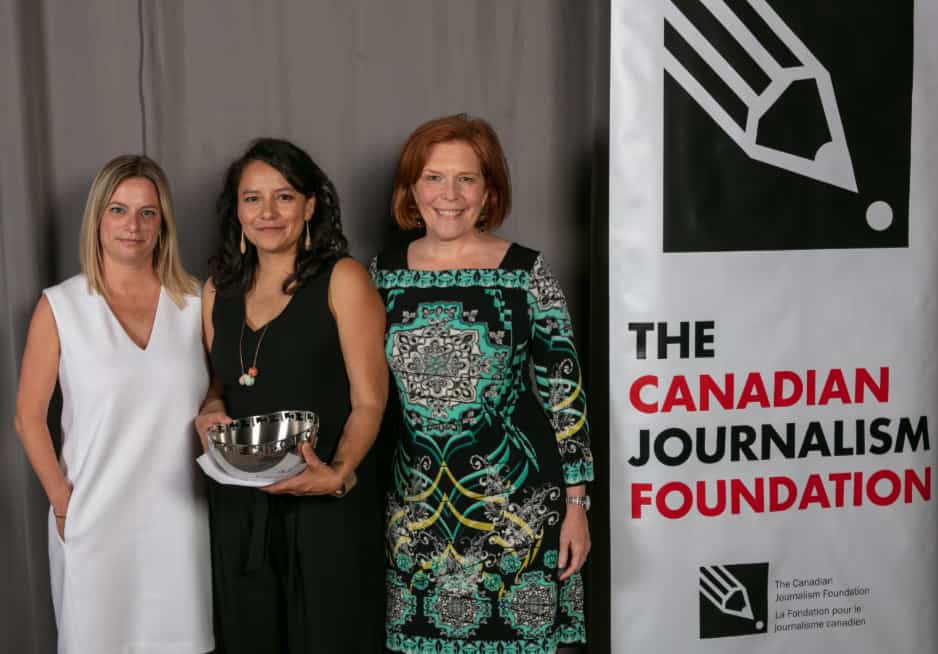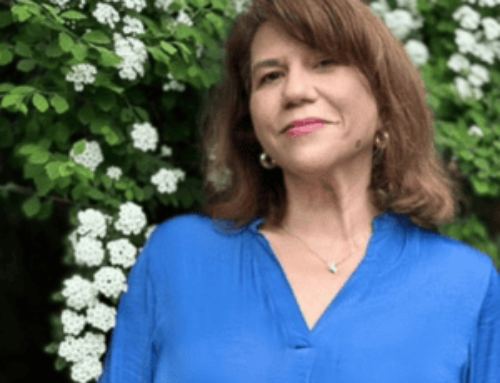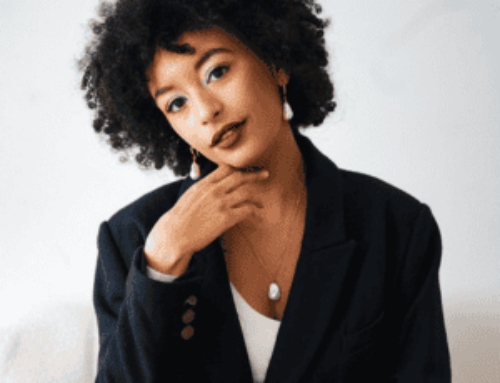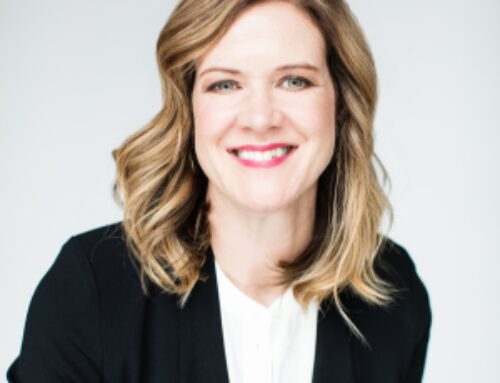Landsberg Award winner Connie Walker is pushing Indigenous stories into the spotlight.
Cleo Semaganis Nicotine was taken from her family on Little Pine First Nation as a child in 1974 to be adopted into a white family. She died a few years later. For years, Cleo’s biological parents and siblings believed she was murdered while trying to hitchhike home to Saskatchewan. They were given no other details from authorities, social workers, or her adoptive family.
Cleo’s story struck a chord with CBC reporter Connie Walker because it was so emblematic of the devastation wrought by the Sixties Scoop, the legacy of which is still very much felt today. Connie herself is Cree, and her commitment to telling Indigenous stories led her to do a deep dive into Cleo’s life and suspicious death. It also led her to bring Cleo’s family along for the investigation.
Finding Cleo is a riveting podcast, but it’s difficult to listen to. It looks unflinchingly at a dark chapter in Canadian history and explores the complexities of a traumatic adoption practice that continued into the 1980s. Throughout the podcast, Connie and her team tell Cleo’s story masterfully, with compassion and grace, and uncover startling new information about Cleo and the program that took her from her home.
In recognition of this incredible contribution to reporting on Indigenous and gender equality issues, the Canadian Journalism Foundation, in association with the Canadian Women’s Foundation, awarded Connie the 2019 Landsberg Award.
When presented with the award at the Canadian Journalism Foundation Awards, Connie addressed the audience of reporters and editors by saying: “Indigenous women don’t need a voice. We need more microphones.”
We spoke to Connie about what it was like to use her microphone to tell this devastating but important story.
What was the most challenging interview of the investigation?
This story is about [Cleo’s siblings] trying to find their sister. But also I think the podcast was a way for them to learn about themselves and about what led to them all being apprehended from their mother in the ‘70s, adopted into white families, and scattered across North America. So as much as this was a journey for them to find out about their sister, this was also a journey of exploration around their really painful and difficult and traumatic childhood.
When we went to these main interviews with them, I very much felt the weight and responsibility of that. In some cases, we would be asking them to talk about what they remembered, and that’s never something I take lightly. I had to prepare to approach those interviews with sensitivity and responsiveness in the moment when things were changing, which was challenging.
Just bearing witness and hearing their stories – and seeing how what happened to them as children impacted their entire lives – was a really eye-opening experience. They were so generous and trusting and giving in terms of sharing their story and sharing their truths, so it was really humbling to spend that time with them.
In one instance in particular, we were dealing with some pretty heavy stuff in terms of [the interviewee’s] own mental health, and that informed how we approached her interview. We were really concerned about triggering her or causing her any more trauma or grief. We also wanted to respect her agency and her desire to be involved and to help find answers about Cleo, and to be included in the podcast. So we really approached her interview very differently than we would have in any other circumstance. We were trying to give control to her by making sure that she was comfortable and making a deliberate choice to not to talk about previous traumatic experiences that she’d had, even going as far as not following-up when those experiences were brought up. because we really wanted to make sure that we were being responsible.
How did you see the long-term impact of the Sixties Scoop at work in the lives of those you interviewed?
That was evident in almost every conversation about Cleo with her siblings. What they had experienced as children before they were apprehended, and after being separated from their family, community, and culture, had – and continues to have – devastating impacts.
I felt that with Crystal* in particular, with the way she articulated the loss and how devastating it was to be moved from her mother and her siblings and her wider community.
At one point, in our search for answers, we went back to their community of Little Pine First Nation in Saskatchewan. Within a couple hours, we had met the Chief of the community, who was also Cleo’s cousin, Wayne Semaganis. He remembered his cousins and he was present when they were apprehended. He remembered having his cousins there with him one day, and then the next day they were all gone. So we were talking to Wayne, and we were sitting in a teepee with him and a couple of other extended family members, and he had invited an elder from the community to come and conduct a pipe ceremony, because he knew that we were going to be talking to people about a really painful part of that community’s history.
A lot of [the community members in the teepee] spoke Cree, so we were hearing them speak that language, and we were participating in this ceremony with Cleo’s family. It was an amazing experience, and for me in particular it was great because it felt familiar to me – I grew up hearing my dad, his brothers and sisters, and my kôhkom speaking Cree. I loved it, but then I thought ‘we shouldn’t be experiencing this.’ All of these things are things that Crystal has been talking about for years, it’s what she’s been longing for. This is her family, this is the language that she was taken from, this is the culture that she was removed from.
On the next leg of our journey, when we traveled to New Jersey to try to get more answers about Cleo’s death, we took Crystal with us. And she was reunited with her brother Johnny after 40 years. Crystal was the one that knocked on the police officer’s door who was the first responder when Cleo died. Crystal was the one who went to the town office to get Cleo’s death certificate.
I think that loss from the Sixties Scoop was evident throughout this story, and that was something that I maybe thought I understood before embarking on the podcast, but it wasn’t until we were going through it that I really got to understand it. I started to understand how affected Cleo’s siblings were.
An undercurrent of Cleo’s story is the legacy of the Sixties Scoop, and how its echoes are still felt today. Did you learn anything new about the practice of taking Indigenous children from their homes to be adopted by white families through this investigation?
I had definitely heard of the Adopt Indian and Métis program before – I think I had probably read a couple of news articles about it. But it wasn’t until we were in the provincial archives in Saskatchewan with banker boxes full of documents, reading through memos written by the program directors and the social workers, that we really got an insight into what happened and why the program was created.
We had a number of conversations with social workers, including one who helped start the program in Saskatchewan. People really felt like they were doing a good thing – like they were giving children who needed a home a good home. For me it illustrated that this is not a black-and-white issue. There were so many shades of gray, and it was important to try to understand, and to flesh out the nuances and complexities. When things are reduced to their simplest form, it’s really difficult to fully understand what happened and to have empathy for real people who are affected by these kinds of government decisions and programs.
We were really grateful to have the space in the podcast to explore those issues, and I think it kind of spoiled me for other kinds of reporting, because podcasting is such a satisfying way to dive deep into a story. It’s also hopefully a great medium to help people connect with the story and gain a better understanding of it.
What was the most rewarding part of telling this story?
There were so many. It was a very traumatic and difficult story at times to hear and to tell, but I think the feedback that we’ve gotten from people was worth it. We’ve been told that this podcast has helped listeners understand this chapter in Canadian history that they didn’t know about because they hadn’t learned about in schools. In particular, the number of educators who are using it in their classrooms is rewarding. I wasn’t taught about the Sixties Scoop in school, and I don’t think anyone of our generation was really.
We didn’t learn enough about the fact that Indigenous people have lived in Canada for hundreds of years. The fact that this education is happening now and that our podcast is part of that education – and that people now know about Cleo and her family’s story – is huge. We’ve also heard from social workers and people who work in child welfare who felt that they had a better understanding of their work after listening to the podcast.
The fact that it resonated with people and that people are listening is the most rewarding thing.
What can reporters in Canada be doing better when it comes to telling stories like Cleo’s? What can they do to better address the reality of missing and murdered Indigenous women in Canada through their work?
I’ve been a journalist for almost 20 years, and I think for a long time there wasn’t very much interest in stories from Indigenous communities in Canada. When there was interest, it was focused around conflict or some terrible crisis that served in some ways to reinforce negative stereotypes about Indigenous people’s lives.
But now there’s been this incredible transformation over the last two years or so. I’m so excited to see so many talented and bright Indigenous journalists who are coming up. They are taking on these important stories and really pushing them into the spotlight, and really helping people understand how diverse Indigenous communities are throughout the country.
It’s our job in the media to be advocates for the truth, and to help people understand the truth about Indigenous people and their history. There are still so many more important stories that need to be told, and I recognize that that’s not an easy thing to do in daily news stories. Sometimes it feels like we’re fighting for seconds in our news day. But with a podcast, you really have space to explore the deeper context and connect the dots in meaningful ways.
I think it’s important to create a space for empathy, and I think the key to unlocking that space is to have meaningful connection. We have to give listeners and readers the space to fully hear and get to know somebody else’s perspective. I know that’s easier to do on a podcast than in a news story.
That being said, there’s never been a better time to be a journalist who’s interested in Indigenous issues: now there’s finally recognition that they are important stories, that Canadians want to hear them, and that we’re all better off for telling them.
*Cleo’s sister has since returned to using her biological name, Crystal. For those who listened to the podcast, her name at the time of the recording was Christine.
Learn More:
- Eight Indigenous Voices You Need to Hear
- Shannen’s Dream: Four Ways to Work Towards Education Equity in Indigenous Communities
- EntrepreNorth: Three Ways To Celebrate Indigenous Innovation and Entrepreneurship
Take Action:
- Sign up for our e-newsletter to have our latest stories and resources sent to your inbox.
- Follow us on Facebook and Twitter to join a national conversation about gender equity for all who identify as women and girls.







